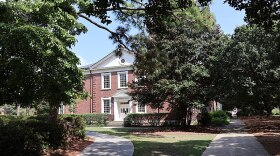Last spring, the UNC system voted to allow campuses to once again raise tuition. As part of the last several rate hikes, schools were mandated to set aside at least 25 percent of new tuition revenue for need-based financial aid for low-income students.
But the UNC Board of Governors will soon decide whether to change that rule. Some Republican members of the Board say the set aside is a “hidden tax” on students who pay full tuition.
The debate over funding need-based financial aid appears to have a political bent.
Dave DeWitt: Don’t let the cheery, yellow curtains ringing the room fool you. The people here are unhappy. It’s a few days into the school year at North Carolina A&T in Greensboro and a couple dozen students with dour expressions sit in folding chairs in a cordoned-off end of the school’s basketball arena. They are here because they have questions about their financial aid. And the wait to see one of the 10 counselors is a long one.
Counselor: Pugh! First initial L, last name Pugh. P-U-G-H.
Samuel Sutton is one of the students waiting to hear his name called. He’s a senior with a quick question about his bill. He holds down two off-campus jobs, has several academic scholarships, and receives state and federal financial aid.
Samuel Sutton: It’s very, very helpful to me. I really depend on it. Without financial aid, I wouldn’t be able to go to school.
About 80 percent of the students at A&T receive need-based aid. So any budget cuts or policy changes have a profound affect here.
Akua Matherson is the interim Associate Vice Chancellor for Enrollment at A&T. She’s keeping tabs on the discussion happening at the UNC Board of Governors on how to apportion financial aid. And she’s worried.
Akua Matherson: The HBCUS are going to have a larger population of need-based students, so any changes to that and the ability not to help those students continues to minimize the enrollment that we have and also being able to just continue to make education available to all students.
One of A&T’s most prominent graduates is Franklin McCain. He was one of the Greensboro Four that led a civil rights protest at the Greensboro Woolworth’s in 1960. He’s now on the UNC Board of Governors, and argued for keeping the minimum 25 percent set-aside for need-based aid.
Other Board members disagreed, and most of them are new appointees. Many are also used to bare-knuckle policy brawls.
David Powers: I’m a very political person, I’ll admit that.
That’s David Powers. He works as a state lobbyist for Reynolds American Tobacco Company. He’s also on the corporate board of ALEC, the American Legislative Exchange Council. Among other things, ALEC pushed the controversial Stand Your Ground Law in Florida.
Other new Board members are equally connected.
New Chair Peter Hans was a senior advisor to three Republican senators. Fred Eshelman funds Right Change.com, a hyper-partisan website.
But even with 13 new political appointees to the Board, Powers says he’s been surprised by the lack of partisanship on the UNC Board of Governors.
Powers: You haven’t seen that kind of partisan divide. Everybody understands why you’re there, and if you don’t pick it up pretty quick, you’re not going to be very effective.
Powers doesn’t like the idea of a minimum set-aside for need-based aid. He favors letting individual schools and chancellors make decisions on the amount.
Powers: That greater flexibility, allowing them more leeway, is a little bit more of a free-market ideal, if you will.
Powers also wants those schools to be more transparent about the policy, so parents who pay full tuition know what percentage of their bill goes to low-income students.
Those are also parts of the compromise proposed by UNC system President Tom Ross. He says he’s committed to keeping college affordable for ALL students.
Tom Ross: We continue to believe deeply in financial aid as a system and I think it’s a question on our Board not so much of whether we should have financial aid or not, that’s not the discussion, the discussion is, how best to provide that.
Ross also points out that tuition costs at UNC system schools are still well below peer institutions across the country, and that won’t change any time soon. What has changed is the amount of funding for financial aid at the state and federal level.
Ross: So there’s a lot of uncertainty out there right now and I think parents have to understand that. But that’s why coming to the University of North Carolina where tuition is low is still a smart decision.
Samuel Sutton has already made that “smart decision” by attending A&T. But the “uncertainty” that’s out there – and any changes that may come to how much need-based aid that’s available - could impact his professional dreams, and the economic future of North Carolina.
Sutton: Once I graduate I plan on getting my professional engineering license and becoming a certified professional engineer and work as a civil engineer. Hopefully, become a project manager. But I’m always inspired to build bridges and structures and things of that nature, so that’s what I plan on doing.
The UNC Board of Governors is expected to vote on the new need-based financial aid policy at its meeting next month.






